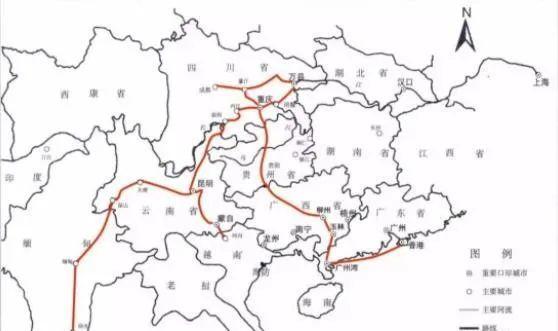In April of the 29th year of the Republic of China (1940), the Leizhou Customs Tariff Collection Office of the Ministry of Finance of the National Government was withdrawn from Guangzhou Bay to Yulin County, Guangxi (i.e., Yulin County, the same below), and due to the rampant expropriation of the tax in the county seat, the people of Qilin rose up to resist for more than 50 days, until the head of the agency and a large number of customs personnel were replaced. In order to let more people understand the local history of Yulin, Xiaobian has compiled relevant materials and paraphrased them for readers.

In the spring of 1940, with the advance of the Japanese invasion, the original international passage was blocked by the Japanese army. So far, only two lifelines of International Material Aid for China's War of Resistance Against Japanese Aggression have remained unblocked. One of them is the famous Burma Highway. The other is the Guangzhou Bay-Yulin-Liuzhou-Guiyang-Chongqing Corridor. Yulin, Guangxi, has become an important transit station for the international transportation route in South China during the war, a transshipment hub for imported goods such as anti-war materials and foreign yarn and foreign cloth department stores, and the largest cargo transshipment and sales place at the forefront of China's South Road.
Since most of the Customs Checkpoints of the National Government were located in the interior, after the original international passage was blocked by the Japanese Army, the customs basically existed in name only, resulting in a sharp reduction in import and export tariffs of the National Government. During this period, the Ministry of Finance of the National Government, Leizhou Customs, performed well, contributing most of the tariffs to the National Government. The reason is that during the War of Resistance Against Japanese Aggression, China's coastal areas fell one after another. At that time, Guangzhou Bay (now Zhanjiang City) was a French colony, temporarily in a quiet corner, with a large influx of refugees from all over the world, a temporary population expansion, economic deformity, and prosperity in commerce and trade. Behind the prosperity is the sharp increase in tariff revenue, and the small life of Leizhou Customs is still quite good. In particular, after China's coastal passage was cut off by the Japanese, Guangzhou Bay became an important trade town and shipping center, and a large number of materials were imported and exported. According to the statistics of Leizhouguan, the Ministry of Finance of the National Government, from 1938 to 1940, in just three years, the annual export of materials from Guangzhou Bay reached 10 million US dollars, which was 20 times that of the pre-war period, and more materials were imported. The volume of goods entering and leaving is second only to Kunming Customs, ranking second in the country.
Since Guangxi Yulin is the only way for goods from Guangzhou Bay to go north to south to go to sea, the geographical location is extremely important, in 1939, in order to facilitate management and taxation, the National Government also included Guangxi Yulin under the jurisdiction of Leizhou Customs. In the spring of 1940, due to the Japanese occupation of the Leizhou Peninsula, the Leizhou Customs of the Ministry of Finance of the Kuomintang government was forced to move to Dongwei, Yulin County, and set up a customs collection office at the south bridgehead of Yulin. Because Leizhou Customs cleverly set up a name in the process of collecting taxes in Yulin and did not hesitate to use any means, the objects of collection greatly exceeded the scope stipulated in the "Tariff Regulations", and even the vegetables sold in the market and the coffins bought for funerals were subject to tariffs, which aroused the strong dissatisfaction of the people of Yulin, and on April 23 and 24 of the same year, a large number of clashes broke out between the masses and the customs and tax police. After the clashes, the person in charge of Yulin of Leizhou Customs tried his best to cover up the truth of the incident, and also beat a rake saying that the people in Yulin did not support the anti-Japanese resistance, and arrogantly demanded that the local government of Yulin investigate the responsibility of the perpetrators. The perverse behavior of the head of The Yulin of Leizhou Customs provoked greater resistance among the Yulin masses, which lasted for more than 50 days, and finally alarmed the Ministry of Finance of the Kuomintang government, and finally replaced the head of the institution and a large number of customs personnel. This organization was withdrawn from Yulin until the victory of the War of Resistance.
Objectively speaking, during the Period of the War of Resistance Against Japanese Aggression, the people of Yulin carried a large amount of anti-war materials with their hands on their shoulders, and made great contributions to the victory of the War of Resistance! If it were not for the leizhou customs in Yulin's violent collection of harsh taxes and miscellaneous taxes, rampant and domineering, and no evil deeds, the people of Yulin would have revolted against it to the bone. Of course, this also shows that the people of Yulin are kind and hospitable and are not so good at bullying!